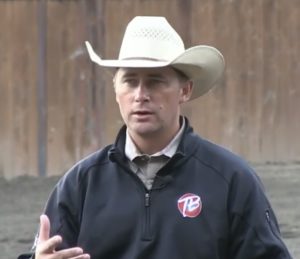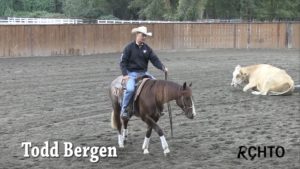
RCHTO Trainer Todd Bergen
Never afraid of a challenge, Todd Bergen used to show in the open classes at 15 years old to gain more experience and to raise his game. At the time, he wasn't sure why his father entered him in the open but looking back, he said it taught him to be comfortable being uncomfortable.
"I used to get really nervous. For a big part of my career I could never eat on the days that I showed. What really helped me, when I was younger, was always competing over my head so when I was in the youth, I was competing in the Open Class too," Bergen said.
Learning to be bold made Bergen a household name in performance horses. He has won $2.2 million in reining and $2.5 million in cow horse competitions. He has won the biggest titles in the National Reining Horse Association (NRHA) as well as the National Reined Cow Horse association (NRCHA). He also produced two top selling DVDs: Framework of Performance and Fundamentals of Cow Work.
Bergen started out working for Bob Avila and mostly focused on reiners and cow horses.
When he first went out on his own in 1990, he had mostly reining horses in training as it had become extremely popular. He now focuses on cutting and cow horses since that is the direction his customers wanted to go.
He has won the NRHA Open Futurity twice in 1995 on Todasmyluckyday, and in 1998 with Chic Please. He has been NRHA Futurity Reserve Champion three times. He took out the 2015 NRHA Open Derby final and won the NRBC two times.
In cow horses, Bergen has won the 2002 and 2006 NRCHA Derby and the Snaffle Bit Futurity Championship twice in 2001 and 2011. He was the 2012 NRCHA Bridle Spectacular Champion, and 2014 NRCHA Open Stakes Champion. He has also been Reserve Snaffle Bit Futurity Champion three times, and World's Greatest Horseman runner up in 2003.
But it wasn't just talent that gave Bergen success, it was also learning to control his thoughts and nerves in the show pen. To get his head in the game, Bergen said preparation is everything. His mental attitude has either helped him win or contributed to his loss, especially when he was in the lead.
Ultimately, Bergen said, "I've always tried to just worry about myself," and not be unduly influenced by others at a horse show. He would watch only people that he knew and respected.
"I think there's a difference between being anxious and having adrenaline going and being nervous. I think nerves come from uncertainty and uncertainty comes from a lack of preparation."
Todd's strategy before he gets to a show is to be solid in each event.
He said some people do not like reining so they don't work on it which puts greater pressure on their other events to remain competitive.
"I want to work equally on all three events because you have to do all three events."
Bergen said confidence can be lost quickly, so you need to look within and see what can be adjusted. "It only takes a couple of bad runs and you're questioning yourself."
If you get to that point, he said, be honest with yourself. Analyze your run, rather than just criticizing it or laying the blame elsewhere.
He said you should ask yourself, "Do I need to get help elsewhere, do I need to change something that I'm doing, or was it just the situation and everything was right."
"You learn as you go, but confidence in yourself and in your training has a lot to do with the nervous side of it."
Bergen said it is a different feel to be the one everyone is chasing. When he was younger he was always trying to get to the top to prove himself.
"I think, to me, it's harder being the guy everybody is after. Once you get to the top and you have big wins under your belt and you're the guy and everyone wants a piece of you and everyone wants to send you a horse. I think it gets way harder because all of your focus can change quickly. You have so many things to deal with," he said.

"I've won several futurity championships and I've won enough of them now to realize that you're only as good as your last ride. And the next ride you could be a complete failure. And it's going to happen. I don't care who you are. You're dealing with a horse and a cow."
When he was younger, his only focus was winning. "When you did win [as a young trainer] it was great because no one expects you to. But when you get to the top now everyone expects you to do well and they want to see you fall on your face. It's human nature."
Bergen said he knows people who enjoy training horses but they don't love the competitive side of it. Bergen said sometimes trainers scored a big win and will struggle under pressure afterwards. When that winning horse goes into the arena, everyone stops what they are doing and watches. And if it goes badly they say, "Oh, I knew it wasn't any good".
"I've won several futurity championships and I've won enough of them now to realize that you're only as good as your last ride. And the next ride you could be a complete failure. And it's going to happen. I don't care who you are. You're dealing with a horse and a cow."
Today, Bergen relies on his experience. For Non-pros, he suggests having a knowledgeable person in your corner because non-pros don't compete as often as trainers.
"If you're not with a trainer I always think it's smart to have a relationship with somebody that you can rely on when you're getting into an area you're frustrated with or when you don't know what to do."
Bergen said he gives each of his clients specific advice for what they need before they show.
"[Some individuals] don't have confidence so I'm going to try to pump them up or some get really excited when they show and tend to over ride and do too much. For them, I'll try to get them to calm down and try to get them to slow down."
"If [non-pros are] frustrated or confused, that's what makes it hard on non-pros and then they fight their head. In their mind they're already fighting [thoughts in their head] so when they show, it doesn't work."
"The reason [the trainer] can coach non-pros is because we have made all of those mistakes. We've fought our head and we've done it. I tell everyone 'the reason I'm telling you this is because I've [made the mistake]."
Bergen said you have to learn to shake off a bad run. He used to be crushed for days when things didn't go right. Now he said, he's over it in 20 minutes because he uses it as a teaching moment. Bergen explained you need to let go of the negative feelings around a bad run so it doesn't affect your confidence. At the same time, there's plenty to learn from the run itself.
"If you get too caught up in your wins and how great you are, you're just looking at the good. I've always dwelled on the bad. One, it keeps you humble and two, it keeps you honest in your training and where you're at and where you stack up. And constantly looking at where you need to improve. If you don't do that you're going to get left behind. If you think 'Well, this is how I've always done it,' you're going to get left behind."
